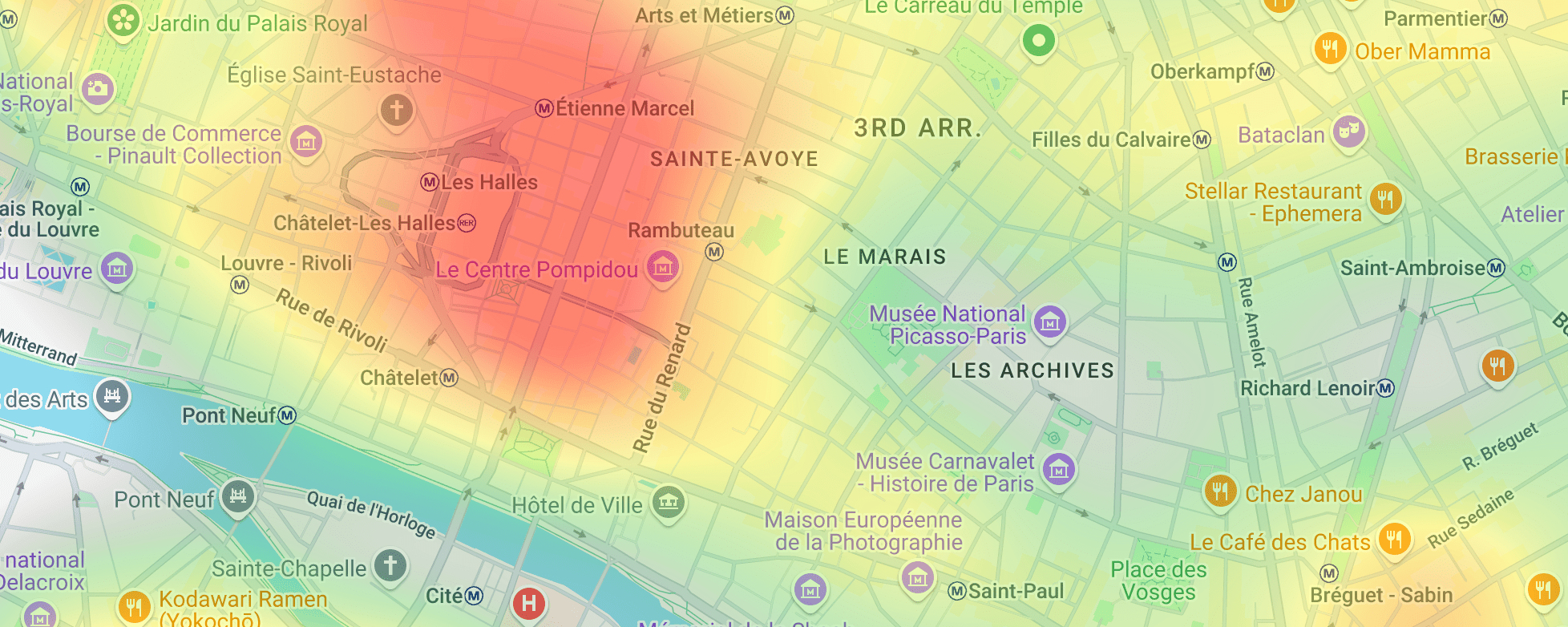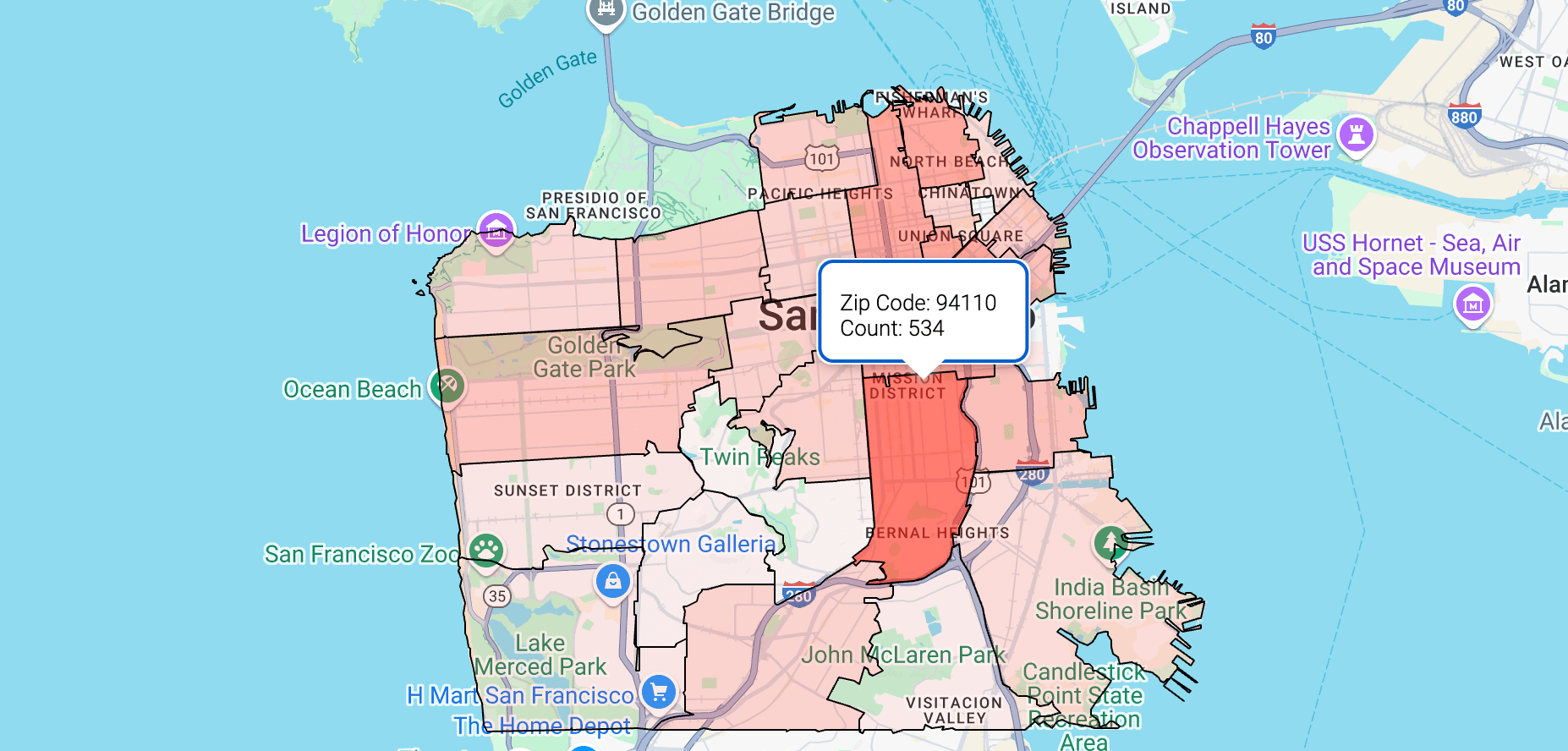Places Aggregate API は、場所、タイプ、営業状況、価格帯、ユーザー評価などの条件に基づいて、指定されたエリア内の場所に関する分析情報を提供するサービスです。このサービスは、特定の場所の周辺にある特定の場所タイプの密度を分析し、「この場所から半径 5 km 以内に、5 つ星評価の $$$ レストランが何軒あるか」などの質問に答えることができます。
結果は、検索対象エリア内の集計数または特定されたプレイス ID として返されます。ユーザーは Place Details API を使用して、これらの Place ID に関する詳細情報を取得できます。
Places Aggregate API を使用する理由
Places Aggregate API を使用すると、さまざまな場所に関する包括的な情報に基づいて、データドリブンな意思決定を行うことができます。正確で最新のプレイスモデルを活用し、次の主なユースケースをサポートします。
- 企業: 競合他社と新しい支店の候補地を分析します。
- デベロッパー: パーソナライズされたおすすめを提供するアプリケーションを構築します。
- 研究者: 特定の分野のトレンドとパターンを分析します。
Places Aggregate API でできること
Places Aggregate API を使用すると、次の情報を取得できます。
- カウント: 条件に一致する場所の数を取得します。
- プレイス ID: 条件に一致する特定の場所のプレイス ID を取得します。
また、フィルタリングを使用して、場所の種類、営業時間、料金レベル、顧客評価などのさまざまな属性に基づいて検索を絞り込むこともできます。
例
このセクションでは、Places Aggregate API のユースケースの例について説明し、各例の動作コードを示します。
新しいカフェのオープン
レストランのオーナーが新しいカフェをオープンしたいと考えています。そのため、まずカフェのホットスポットを可視化して、高密度地域と低密度地域を特定し、ビジネス上の意思決定に役立てたいと考えています。Places Aggregate API を使用すると、営業状況、価格帯、顧客の評価などの属性に基づいて、特定の半径内のカフェの数を分析し、次の店舗をどこにオープンするかについてデータに基づいた意思決定を行うことができます。

不動産投資会社
ある不動産投資会社が、財務モデルを強化し、計画している不動産投資の ROI を正確に判断したいと考えています。Places Aggregate API を使用すると、ATM、病院、交通機関の駅、食料品店など、投資対象となる可能性のある物件の近くにあるアメニティに関する詳細なデータを収集し、投資対象となる可能性のある物件の近くにあるアメニティを把握できます。
小売宅配サービス
新しい都市に拡大する場合、小売りの配送サービスは、レストラン、コンビニエンス ストア、酒屋などの人気のある消費者の目的地密度に基づいて、地域に割り当てる配送ドライバーの数を決定する必要があります。API を使用して、配達サービスは市内のこれらの店舗の総数をカウントし、リソースを効果的に計画して割り当てることができます。

Places Aggregate API の仕組み
Places Aggregate API では、フィルタを指定して検索条件を絞り込むことができます。分析情報タイプとして INSIGHT_COUNT または INSIGHT_PLACES を選択したら、次のフィルタ条件を追加できます。
- 地域: 円、地域、カスタム ポリゴンを使用して、対象地域を定義します。
- タイプ: 興味のある場所のタイプを指定します。
- 営業状況: 営業状況に基づいて場所をフィルタします。
- 価格帯: 価格帯に基づいて場所をフィルタします。
- 評価: ユーザーの評価に基づいて場所をフィルタします。
API レスポンスの ComputeInsightsResponse オブジェクトには、リクエストの分析結果が含まれます。たとえば、INSIGHT_COUNT を選択した場合は、レスポンスに場所の合計数が含まれ、INSIGHT_PLACES を選択した場合は、レスポンスにプレイス ID のリストが含まれます。
Places Aggregate API の使用方法
| 1 | セットアップする。 | Google Cloud プロジェクトを設定するから始めて、以降の手順を完了します。 |
| 2 | 一致する場所の数を取得するリクエストを作成します。 | 最初のリクエストを送信するをご覧ください。 |
| 3 | リクエスト パラメータの詳細 | リクエスト パラメータをご覧ください。 |
